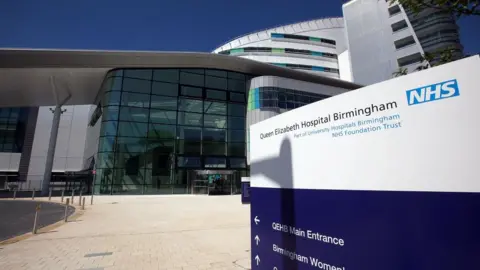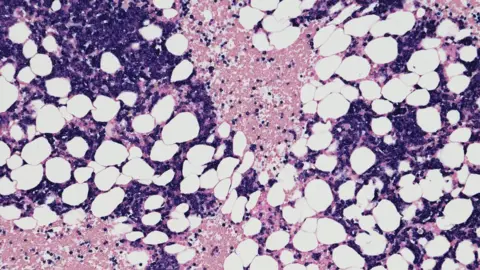Coronavirus: Queen Elizabeth Hospital suspends cancer transplants
 Getty Images
Getty ImagesBlood cancer transplants have been halted at Birmingham's QE Hospital after three patients caught Covid-19.
A woman with myeloma tested positive for coronavirus on a specialist haematology ward, nearly a week after a transplant.
Two more haematology patients who were nearby have also since tested positive.
Queen Elizabeth Hospital said transplants had been paused as a precautionary measure, but would hopefully resume in the next few days.
The specialist ward, known as ward 625, is a Covid-free zone, meaning patients are only allowed into it once they have tested negative for the virus.
Sources have told the BBC it was likely to have been spread by two nurses who showed no symptoms, but subsequently tested positive.
Those sources claim that the need to routinely test staff dealing with very vulnerable cancer patients was first raised in May, but staff only began having routine tests this week after the outbreak had occurred.
Backlog of patients
The hospital said both nurses were self-isolating and no other staff had so far been affected. It added routine tests for haematology and oncology staff had begun on Monday, in line with NICE guidelines.
 Getty Images
Getty ImagesA backlog of 37 myeloma patients waiting for stem cell transplants has built up because of a slow-down in procedures over the summer, during lockdown.
Myeloma is a type of bone marrow cancer and can often affect several parts of the body.
Dr Ira Laketic-Ljubojevic, from cancer charity Myeloma UK, said patients with the condition were "extremely clinically vulnerable" to Covid-19 and were in a very difficult position "as there are serious risks associated with both treating and not treating their blood cancer".
The original myeloma patient who tested positive had received an autologous stem cell transplant.
This involves high dose chemotherapy which kills the myeloma cells, but also kills bone marrow cells.
They would then have stem cells returned to restore their bone marrow.
The treatment can extend survival, but the patient's immune system is severely compromised during the process so they are at serious risk from viruses.

Follow BBC West Midlands on Facebook, Twitter and Instagram. Send your story ideas to: [email protected]
